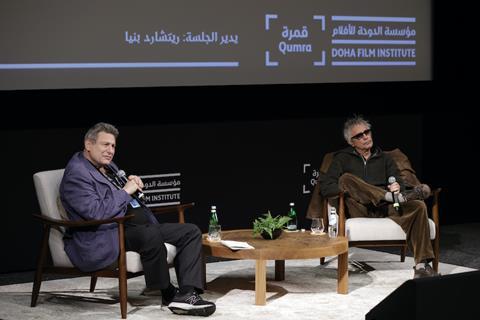
French director Leos Carax has revealed new details about his upcoming autobiographical film, C’est pas moi, which he says is “about 40 minutes long” and may be ready in time for Cannes.
“It started with a museum in Paris. They asked me to do a self-portrait,” the director explained of the project, which is now in post-production. It is produced by Charles Gillibert and sold by Les Films Du Losange.
Denis Lavant acts in the film, as does his daughter. “The rest of it is images from archives, from other people, and from me with my iPhone,” said Carax. Lavant has appeared in previous Carax films including Bad Blood, Lovers On The Bridge and Holy Motors; he will also edit the film.
It’s expected, though unconfirmed, that Lavant will again play Monsieur Merde, the character who featured in ‘Merde’, Carax’s part of 2008 anthology film, Tokyo!
During a wide-ranging discussion during his Qumra masterclass in Doha, Carax expressed his disdain toward some producers with whom he has worked – without naming names.
“There are two kinds: the ones you like and the ones you don’t like,” said Carax. “When you don’t like them, it is easier to take their money. When you like them, it’s trickier but there’s a strength there.”
One producer he did like was Alain Dahan, with whom he collaborated early in his career. “He was a Jewish gangster, a very nice man but crazy and drunk,” said Carax. “We stole money, bluffing or pretending or whatever.”
The French industry remains the pinnacle of film production, the director believes. “I can say a lot of bad things about France but it is still the easiest place, the least bad place, to make films. We’re spoilt in that way.”
Career retrospective
The veteran auteur briefly worked as a critic for French film publication Cahiers Du Cinema. “I was really not good at it but it was nice for me because I could travel and see films.” He made his first feature film Boy Meets Girl in 1984, with the title screening in Cannes Critics’ Week.
Carax dismissed the idea of tidy plots in his movies, claiming that he had always approached filmmaking as if he was “composing music.”
“For sure, I am not a storyteller; not many filmmakers are good storytellers,” he said. “Personally, I am very attached to storytelling. I am not against it at all. It is just a power I don’t have.”
Another was actor Lavant, a circus performer and mime artist whom he recruited initially on the basis of how he looked. “I saw a photo of this boy who was my age and my size with this strange face…[I thought] at least he is different.”
1991’s Lovers On The Bridge (French title: Les Amants Du Pont-Neuf) starring Lavant and Juliette Binoche as a young homeless couple, was one of the most expensive French films of its era. Ironically, the director had originally planned to make a low-budget Super8 musical.
“I had seen this young homeless couple, very beautiful, fighting, obviously loving each other - it started from there,” Carax recalled. The authorities in Paris wouldn’t allow him to close the Port Neuf, the oldest bridge in Paris, for the time he required. He therefore rebuilt it in the countryside. The budget rocketed and, after various production mishaps and feuds with producers, the film finally took three years to make.
It included documentary-style of real-life street vagrants. This posed ethical challenges. “It became impossible because they drink. They know [they are being filmed] and then they forget. You feel like you are stealing images., You feel like you shouldn’t be doing that.”
Carax now shoots his films on digital, something he initially imagined that he would never do as a lover of celluloid.
“I decided that if I shoot on digital, I wouldn’t watch any images, no dailies. When I filmed on film, I’d have dailies and watch what you had shot the day before. That’s one reason my films became more and more expensive because I would see images and re-make everything. By not watching, I go much faster!”
However, Carax also said the world is now swamped with far too many images. “If I was a nice dictator, I would not allow people to share more than 24 images a year,” he said, noting an over-abundance of selfies and pictures shared on social media showing pet cats playing with feathers. “In religion, images were sacred; we went from that to this. Too many images!”
The French director also spoke about his 2021 feature Annette, which opened Cannes, and the increasing importance of music in his cinema. “When I was a young boy, music rejected me. I wasn’t that good. To make cinema, you don’t need to be good at anything so I went to cinema,” he said.
Annette, which was originally brought to him by pop duo Sparks, featured 40 songs. “When I finished, I thought I could never go back to making a film with spoken words,” the director concluded.
Qumra continues with a masterclass from Birdman sound editor Martin Hernandez tomorrow (March 5).






![The Brightest SunScreen[Courtesy HKIFF]](https://d1nslcd7m2225b.cloudfront.net/Pictures/274x183/3/5/0/1448350_thebrightestsunscreencourtesyhkiff_312678.jpg)


















No comments yet